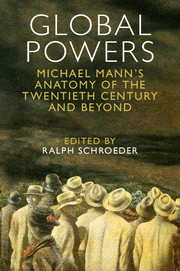15 - Response to the critics
from Part V - Response
Published online by Cambridge University Press: 05 April 2016
Summary
I want to thank all the contributors to this book for having taken the time and trouble to critique my recent work. It is an honor that I have experienced before, and I love it.
The third and fourth volumes of The Sources of Social Power bring to an end my history of power relations in human societies. Volume 3 begins for the most advanced countries in 1918. Yet since my second volume on the long nineteenth century largely ignored the empires of that time, in Volume 3, I actually start my discussion of empires much further back. Volume 3 then takes the narrative forward to the end of the Second World War, and then Volume 4 takes over up to (almost) the present day. The amount of empirical material I read for these volumes is large but very far from exhaustive, since an enormous amount has been written about the modern period. It would be very surprising if I did not make mistakes or depended on unreliable historians or took one viewpoint in highly controversial debates.
But my narrative is not merely empirical. It is informed by sociological theory. As before, I structure my narrative in terms of the interplay of four power sources, each one of which generates its own networks of interaction. The four are ideological, economic, military and political power. Although all four are often entwined with each other, each has its own distinct logic of development, and so their relations with each other are ultimately “orthogonal,” independent and irreducible one to another. Thus, while in these periods I persistently stress the importance to social development of capitalism, I am also persistently critical of economic determinism, whether this comes from Marxism or neo-classical economics. Similarly, while recognizing the importance of ideologies in these periods, I reject the idealism which pervades much of the so-called cultural turn in sociology. For military power I try to correct the opposite tendency, the neglect until very recently of the importance of war and armed forces in social development. I would like to believe that the recent revival of interest in military power owes something to my influence. I will say something later in this essay about the continuing political importance of the nation-state.
- Type
- Chapter
- Information
- Global PowersMichael Mann's Anatomy of the Twentieth Century and Beyond, pp. 281 - 322Publisher: Cambridge University PressPrint publication year: 2016
References
- 6
- Cited by

